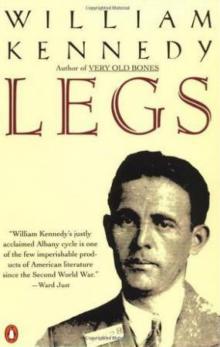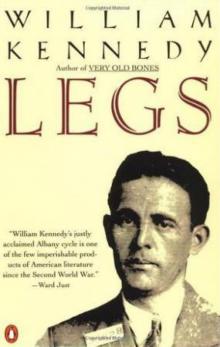- Home
- William Kennedy
The Last Mission Page 23
The Last Mission Read online
Page 23
“Well, now, that’s not necessarily true. A record involving several towns would probably have been kept in central records here in Norwich.”
“Here? All in one place?”
He clears his computer screen, brings up a menu, and begins working his way through the submenus. “Nineteen forty-three, did you say?” He enters it while I’m still nodding and brings up another list of menus.
“United States Air Force, was it?”
“Yes…no, no. At the time it would have been United States Army. We were still part of the army then.”
His fingers fly, and data cascades up and down the screen. He’s a clerk in all his glory. Then he smiles triumphantly. “Microfiche,” he says, making it sound like eureka. “Everything from that period is on microfiche.” He leaps out of his chair and rushes past me. “Come on,” he shouts over his shoulder, summoning me to follow quickly, as if the building were on fire. We enter a room where one wall is all shelves stacked with small, labeled packages. Barnes dances for a few moments, then zeros in on a particular sector. His eyes scan from the ceiling all the way to the floor. “Right here,” he says, indicating a shelf and stretching out his arms to take in about fifty of the packages, then he realizes just how many records his embrace encompasses. “My goodness! You lads must have gotten into a great deal of trouble.”
I stand next to him for a moment, reading the labels, and I can cut the range down to perhaps ten microfiche packages. “Can I look at these?”
“Of course. Let me show you.”
He goes to the viewing machine and turns into a grade school teacher making the on/off switch sound like science fiction. He gives me several demonstrations of how to install the spools and then takes me through the complexities of the controls. Forward. Reverse. Fast forward. Rewind. I listen patiently, even though I’m pretty sure I can handle it. Finally, he turns the machine and the records over to me and leaves me to my work. Two hours later, when he sticks his head in and offers me a cup of tea, I’m still on my second roll. “We did get into a lot of trouble,” I tell him as we stand next to his kettle, “and I think you folks documented every incident. Do you know you have six pages on an incident where an American forgot to pay his bar bill? Less than a pound. Maybe a few dollars at the time. And someone thought it was worth six pages?”
“That surprises you?” he asks, bewildered by my question.
“There was a war on, for God’s sake! London was bombed. Coventry was in ruins. Thousands of English and Americans were being blown to pieces every day. And you people were worried about a three-dollar bar tab?”
“Not worried, just aware. One bar tab was probably insignificant, but it might have turned into a trend. And how would we have known if we didn’t keep records? That’s what a society is, Mr. Marron. It’s records. Without them, we’d all be lost in chaos. Pretty soon no one would pay a bar bill. Then where would we be?”
It’s midafternoon when I find it. In the matter of misappropriation of American military insurance benefits. It’s a chronological listing of events at seven different Air Force bases. More than five hundred flyers were involved, representing insurance payments of better than three million dollars. The women beneficiaries took in thirty thousand to sixty thousand each in just one year. That was at a time when five thousand dollars a year wasn’t a bad wage. No wonder Browning wouldn’t let go of the case. As Andrew Barnes said, the individual bar tab had become a trend.
And then I find the name that I had forced myself to search for, always hoping that it would never appear. Angela Priest. She had been listed as a beneficiary on the policy of a fighter pilot who was downed over Germany. Sergeant Browning had intercepted the check and informed her that it was all the evidence he needed to send her to prison. Then he had recruited her, at first to name her fellow conspirators, and then to follow up on the murder of Mary Brock. Her introduction to me had been simply a part of Browning’s investigation. My interest in Angela was the key to our personnel files. The sergeant needed information that the Americans wouldn’t give him. Angela was the enticement for me to steal whatever he needed.
I read on, sadly, finding duplicates of the reports that were in the Mary Brock file, but now they have a different meaning. When Browning comments that I was quite taken by the young lady, he wasn’t observing the happiness of a budding romance. Rather, he was enjoying the brilliance of his scheme. He had found a way into the forbidden Air Force files.
Barnes shows me how to make copies of several pages. “Bad news, I take it?” he comments as I take my leave and thank him for his efforts.
“I suppose so, but it’s nothing drastic—or even important. Just a happy memory that won’t be so happy any more.”
“Oh, that is painful,” he sympathizes. “I’m sorry that you ever found the record.”
“It is painful, but I’m not sorry, at least not yet. Right now it’s more like anger.”
At the bar, Arthur Lyons takes out his glasses and sets them at the end of his nose. “Are you sure you want me to read this?”
“It’s the conclusion of our investigation,” I tell him, with a wry smile. “I think you’re entitled to the answer.”
He reads, squinting at blurred photocopies of poorly photographed records. He shakes his head in disbelief when he reads the size of the scam and the number of Americans who were taken for their insurance money. He even allows a “Tsk, tsk,” when he comes to Angela’s name.
Arthur folds his glasses carefully before he looks up. The sadness in his expression is nearly tears. “I’m sorry, Yank. Truly sorry.” Then, with a weary sigh, he adds, “I suppose you’re ready to go back?”
I nod, but then correct myself. “There’s just one more detail. I know who killed Mary Brock. I want to add it to the record, and I’d like to give it to Browning’s son, in case he ever finishes his father’s memoirs.”
I bid Arthur good night, but I’m called to the desk as I pass through the lobby. It’s a message from Kit that does nothing to shake me out of my doldrums. “Todd made his appearance this morning. He will be going away for six months to two years.”
I know that she doesn’t mean to Canada.
Then
Todd was the cause of our move out of the city and into the suburban lifestyle that eventually alienated him from everyone who loved him—just the opposite of what Kay and I intended when we set out to find a house in the town where we had grown up. I suppose, after the experience of the Depression, our parents were happy to move to the “country” as soon as they began making money, and we absorbed their attitude that the run-down city might be exciting for artists and transients, but was no place to raise a family.
What we thought our children needed was security. The physical security of being an hour’s train ride from the crime-ridden streets. The financial security of a corporate career. The emotional security of marching in lockstep with the rest of your generation. Somehow, we thought this was the fresh air that our children would thrive on. Just as important, it was the lifestyle we yearned for after a generation when nothing was certain, nothing secure.
Much later in my life, I began to wonder how young men who had soared above the clouds could embrace such earthbound lives, or how men who had risked their lives every minute of every day could ever get serious about work where they risked nothing more than an office with a window. I remember that when I was being recruited by Surety Reinsurance, the company representative told me that Surety was an exciting adventure. “In this company, men still in their twenties are managing multimillion-dollar portfolios,” he said with total reverence. “Make a mistake and you can cost the shareholders a million dollars.”
He was so impressed with the staggering weight of the responsibility that it would have been impolite to laugh, but I had lived in a situation where men not yet in their twenties were managing four-engine bombers, loaded with enough explosives to wipe Surety Reinsurance off the map. And a mistake, even a split-second lapse in judgment, could have cost t
en men their lives. “Cost the shareholders a million” and the sun still comes up the next morning. Turn in front of another plane in the formation, and for twenty men the sun never comes up again. It’s so peculiarly American to value financial security more than the lives of real people.
How could anyone who had been caught between flak and enemy fighters ever feel passionate about a reinsurance company? How could anyone even think of joining one? But I waited for the letter as if it were my invitation to paradise, and I rejoiced when it told me I had the stuff for a career in the firm. Sort of like helping the hangman tie his knot.
We started our married life in the center of the city. Kay had found a job as an assistant editor at a fashion magazine based in midtown, so that was where we took our apartment. From the East Side she could walk to work, rain or shine. I was just a block from the Lexington Avenue subway that could get me down to the financial district in fifteen minutes. What could be more convenient?
Our parents were thrilled that we were getting a good start and that we would certainly make it, in the vernacular of the day. We weren’t living, but rather starting on a path that would eventually lead to something more. The it that we were striving for was really what life was all about. In the war, each instant of life was cherished. Now, each instant was significant only in as much as it led to the next instant. We weren’t standing; we were leaning forward.
Kay’s work was purposely feminine. Her beat was hosiery, and women’s stockings appeared in a single feature and as part of an ensemble in each month’s issue. She spent her time on the phone with Seventh Avenue designers and North Carolina manufacturers, researching trends and gathering samples. She scheduled photo shoots and then wrote breathless copy about a new shade of taupe, or a novel way of stitching toes and heels. She described it as fun—completely frivolous and trivial. That didn’t matter. It was assumed that she would work only until we could put together a down payment on a house, then her career would be motherhood.
My work was obviously masculine, to be performed only by serious types in dark three-piece suits, and it was anything but frivolous. I insured the security of the companies that insured the security of the policyholders. I was at a desk in a room of desks, set in rows and aisles like the furniture in a classroom. My tools were pages of actuarial tables, reports of properties and businesses insured, rate tables, and a clattering desktop machine that used gears and levers to add and subtract, multiply and divide. Paper came down one aisle and left by the other. I was in between.
I had done that for a year when I was suddenly informed that I was moving up. There would be less paper, fewer people, a smaller room, and a larger salary. My clattering calculator was replaced by a telephone so I could call my counterparts at other insurance companies to buy or sell risk.
The progress in my responsibilities didn’t bring any more excitement. In my second summer, I began to feel a mind-deadening boredom and started to consider other kinds of work. It was exactly at that moment that Kay brought me two items of wonderful news. First, with our wedding gifts and our savings, we had a down payment. And second, we were expecting our first child. Then came even more good news. I had been picked to be assistant manager of our mines and minerals department, which bought shares of policies covering the extracting industries. In businesses where mines could collapse and gasses explode, the financial risks were enormous—too large for any one insurer. So we traded parts of the responsibility, like shares of stock, with financial institutions all over the world. The promotion came with a private office, though not yet with a window, a shared secretary, and a wooden desk with side chairs. It also delivered an even bigger paycheck. So the cycle was launched. Growing needs demanded more income. And more income demanded more needs. The house required a raise. Then the raise allowed finer furniture. Which, of course, was more expensive and therefore demanded another raise that, in turn, suggested a larger car.
Todd was born into this cycle six months after we had moved into the cute three-bedroom house in Westchester County, north of the city. It was the perfect starter house, Kay’s mother said. No doubt about it. We were definitely going to make it.
His early childhood was unremarkable to anyone outside our families. He grew, learned, was inoculated, enjoyed play, survived fevers and poxes, and gave us all great joy. He was a doting brother to his younger sister, and for a while was never photographed without little Kit on his lap.
His first crisis involved his schooling. The public schools seemed fine to me, but Kay wasn’t too sure. The social upheaval we later identified as the Sixties was just beginning, and terror was sweeping through the middle-class world. Boys were letting their hair grow, an abomination to their crew-cut parents. I remember swearing that I would personally take the scissors to any son of mine who decided on a ponytail. Young girls were discarding their bras, which Kay felt was synonymous with soliciting out of a doorway. There were rumors that marijuana was being grown on high school grounds and that dope smoking had reached down into the sixth grade.
The public schools, like parents themselves, stood frightened and trembling before these trends. So even though Todd was just entering the second grade, Kay wanted the security of a private school. With Todd sitting between us on the sofa in a headmaster’s office, we were offered assurances that the school would guide Todd to become a miniature clone of ourselves. He would be molded in our values and would pride himself on being just like us.
We were overwhelmed with gratitude, and so instead of letting Todd become what he wanted to be, we determined for him what he should be. He should keep his hair short and parted, just like mine. He should wear a white shirt, tie, and jacket in close imitation of my three-piece grays. He should develop his skills at paperwork. Toe the mark, and his mentors were pleased. Exhibit a bit of individuality, and there were frowns and scowls to pull him back into line. Through his six years of grade school he was a model student, giving Kay and me countless reasons for pride and joy, as he earned good grades, starred in soccer, and kept his shoes bright and shiny.
Kit was another matter. At her convent school she was something of a rebel, or at least as much of an individualist as a grade school girl can be. At various times we were told that she was irreverent in chapel, a constant talker in study hall, overly aggressive in field hockey and soccer, and poorly prepared for her classes. It seemed that she would never make it to the women’s charity-club circuit that was the preferred ambition for all young ladies in the school. Todd might be growing in my image and likeness, but Kit certainly wasn’t behaving anything like Kay.
It was in high school that the roof fell in. By the early seventies, Vietnam had destroyed the American consensus and torn the fabric of the country to pieces. Just into their teens, young people had to decide for or against the establishment. Todd decided against, and since Kay and I were comfortably “establishment,” he decided against us. His hair grew long and dirty. His thin beard went unshaved. Jeans and a T-shirt became the uniform of his protest, and Che Guevara became his hero. Sports were now a bourgeois distraction, and LSD developed the full potential of the mind.
Kay and I were stunned. Bewildered as to how to communicate with our domestic revolutionary, we fell back on the discipline that had served us so well. We promulgated a clear-cut manifesto of what Todd could and could not wear, do, say, or even think. When he ignored the manifesto, we introduced punishment, denying him spending money, use of the car, his own phone line, a stereo system—all to no avail. Todd found sources of money, got rides in friends’ cars with bare tires and shattered windows, bought a personal stereo that fit over his ears. He ignored curfews, came home drunk, and introduced the sweet scent of hashish into our home. Needless to say, no private school would keep him. Our son was out of control and there wasn’t a damn thing we could do about it.
Kit, who had referred to her brother as a nerd through his grade school years, now called him a freak. She, too, was in a public high school, not because the private schools
didn’t want her, but because she didn’t want the private schools. As always, she was her own person, refusing to toe anyone’s line or to join anyone’s parade. “Todd is just afraid he won’t be noticed,” she told us, trying to advise us that he was more to be pitied than censured.
I wasn’t big on pity, at least not for Todd. I had flown with boys his age and had seen them fight their way through flak and cannon fire just to drop a few wobbly bombs on the enemy. I had photos of their peach-fuzz faces taken through the sight of an aerial machine gun. I had heard them scream when cannon rounds had exploded in their faces and seen their drained bodies carried out through the bomb-bay doors. One young man, perhaps a year or two older than Todd, had dropped headless out of the top gun turret. Another had refused to bail out in order to help me land a crippled plane. It seemed that my generation of young men had fought and died just to assure that Todd’s generation had a future. And this is what he was doing with the opportunity they had purchased so dearly. Pity? Hardly. He was my own son, yet all I could feel was contempt.
But Kay could sympathize. “They’re trying to find themselves,” she said of Todd and his friends. That struck me as even more incongruous. I had found myself in the cold fear of a mission and I couldn’t imagine how he was supposed to find himself when his brain was dulled by dope. “They’ll put it all together.” They wouldn’t have to if they hadn’t taken all we had given them and torn it apart.
I laughed at the idea of his going to college. Were we supposed to pay the outrageous cost of tuition and residence so he could cut classes and set fire to the dorm? But Kay thought it was his only chance. College would protect him from the police, who weren’t allowed on campus, and the military recruiters, who were run off even by the professors. What did I want? To see him drafted into Vietnam? Or have him run off to Canada? We argued for a year, but in the end Kay won out. By then I had an office with picture windows on two sides, a desk the size of an aircraft carrier, and an ensemble of sofas, lamps, and chairs that was better than the furniture at home. I had money to burn: more than enough for Kit’s education and Todd’s maintenance. So why not spend it to keep Todd out of jail?

 Riding the Yellow Trolley Car: Selected Nonfiction
Riding the Yellow Trolley Car: Selected Nonfiction Changó's Beads and Two-Tone Shoes
Changó's Beads and Two-Tone Shoes Ironweed
Ironweed The Ink Truck
The Ink Truck Billy Phelan's Greatest Game
Billy Phelan's Greatest Game Legs
Legs Very Old Bones
Very Old Bones The Last Mission
The Last Mission The Flaming Corsage
The Flaming Corsage Roscoe
Roscoe Quinn's Book
Quinn's Book Ironweed (1984 Pulitzer Prize)
Ironweed (1984 Pulitzer Prize) Riding the Yellow Trolley Car
Riding the Yellow Trolley Car Legs - William Kennedy
Legs - William Kennedy